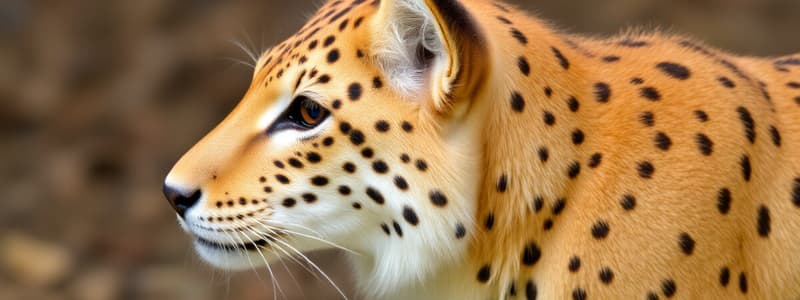Podcast
Questions and Answers
What is the main characteristic that distinguishes mammals from other animal classes?
What is the main characteristic that distinguishes mammals from other animal classes?
- Presence of gills
- The ability to fly
- Being ectothermic
- Having fur or hair (correct)
Which of the following is NOT a typical feature of reptiles?
Which of the following is NOT a typical feature of reptiles?
- Having feathers (correct)
- Cold-blooded metabolism
- Scaly skin
- Laying eggs on land
Which of the following best describes a key physiological adaptation of amphibians?
Which of the following best describes a key physiological adaptation of amphibians?
- Exclusively live in aquatic environments
- Possess a high tolerance for salt
- Have three-chambered hearts (correct)
- Convert ammonia directly to urea
What ecological role do decomposers primarily serve in an ecosystem?
What ecological role do decomposers primarily serve in an ecosystem?
What is the primary method of energy transfer in a food chain?
What is the primary method of energy transfer in a food chain?
Study Notes
Mammalian Distinction
- Mammals are distinguished by the presence of mammary glands, which produce milk to nourish their offspring.
Reptile Characteristics
- Presence of scales is a defining characteristic of reptiles.
Amphibian Adaptation
- Amphibians exhibit a dual life cycle, transitioning from aquatic larval stages to terrestrial adult forms.
Decomposer Function
- Decomposers break down dead organic matter, returning nutrients to the ecosystem.
Energy Transfer
- Energy is transferred within a food chain through consumption and assimilation, moving from producers to consumers.
Studying That Suits You
Use AI to generate personalized quizzes and flashcards to suit your learning preferences.
Related Documents
Description
Test your knowledge on the distinguishing features of mammals, reptiles, and amphibians. This quiz also covers the ecological roles of decomposers and energy transfer in food chains. Challenge yourself with these key concepts in biology.




